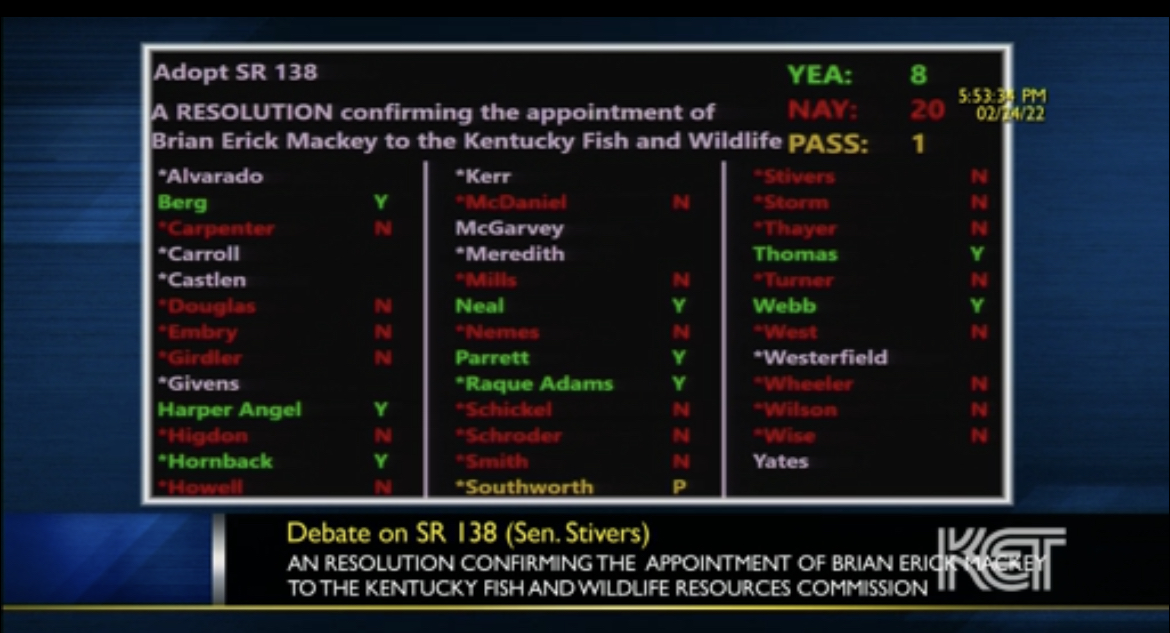
This op-ed from the LaCrosse Tribune raises concerns similar to concerns that emerged during Kentucky 2022 legislative session.
https://lacrossetribune.com/opinion/columnists/tony-wilkin-gibart-chang…
Sen. Robert Stivers orchestrated the defeat of two gubernatorial nominations — one to the Public Service Commission and one to the Kentucky Department of Fish and Wildlife Resources Commission — demonstrating his unfeigned contempt for accountability by refusing to “yield to questions” posed by Sens. McGarvey and Yates about his unsubstantiated attacks on the nominees.
“Senate Republicans deny key Beshear appointments but are short on reasons why”
https://amp.kentucky.com/news/politics-government/article258774438.html
https://ket.org/share/legislature/archives/?nola=WGAOS+023164&stream=aH…
Stivers insulated himself and all state lawmakers from accountability in 2021 by amending the open records law to exclude the General Assembly and Legislative Research Commission. Attorney General Daniel Cameron extended the same “courtesy” to all other public servants later in 2021 by declaring their emails and texts — concerning public business but transmitted on their private devices and accounts —inaccessible under the open records law.
Cameron’s 2021 open records decision eliminates the need to pick up the phone to avoid accountability and pesky open records law. Should Cameron’s poisonous position prevail in Kentucky’s appellate courts, officials need only use their personal cellphones and accounts to communicate amongst themselves about public business in order to evade public scrutiny.
Guest columnist Tony Wilkin Gibart writes in the LaCrosse Tribune:
“Last month, Greg Kazmierski, chair of the Natural Resources Board (NRB), gave his first address to the Wisconsin Conservation Congress, an elected body of citizen volunteers that advises the NRB on environmental policy in Wisconsin.
“Given the controversy surrounding the continued refusal of NRB member Fred Prehn to step down after the expiration of his term, one might have expected Kazmierski to shore up trust in the board.
“Instead, he reinforced the perception that some board members no longer consider themselves accountable to the people.
‘Don’t be hesitant to pick up the phone and give us a call,’ Kazmierski said to the assembled delegates.
“OK, that is good. The chair of the NRB wants to hear from Congress delegates. What came next is the problem.
“‘Matter of fact,’ he continued, ‘I prefer to communicate that way. In this litigious era that we’re in right now, with open records and all that kind of stuff, I’d rather just...talk one on one with you.’
“Even by the standards of today’s politics and the erosion of democratic norms, this is troubling. Why doesn’t Kazmierski want the public to know what policies are being discussed by NRB members and Conservation Congress delegates? These officials are supposed to represent our interests.
“While the NRB and the Conservation Congress were once models of openness in government, they have increasingly come under the influence of officials who disregard public accountability.
“More than a year after his term expired, Prehn remains on the NRB. He argues he can stay in power because the state senate has refused to vote on Governor Evers’ nominee to replace him.
“Prehn’s refusal to step down has allowed him to cast the deciding vote in key decisions related to statewide environmental policy, including the decision to weaken safe drinking water standards. He also cast the deciding vote to make Kazmierski the new chair.”



